⛽️ Bad Energy? Europe's Reliance on Russian Oil and Gas
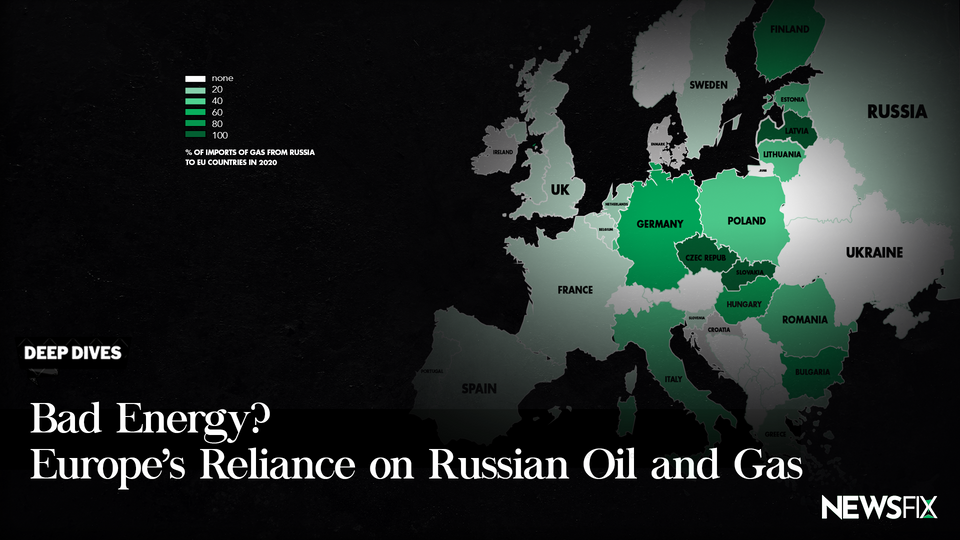

Morning all,
Since the invasion began more than a week ago, much of our coverage has quite rightly focused on both the civilian impact, and the geopolitical implications to this war.
Today, we want to explore Russia's role as an energy giant, and what that means for Europe and the West in light of its actions in Ukraine.
Until Monday,
Your Fixers
RUSSIA'S FOSSIL FUELS
When it comes to reserves, Russia has the most gas of any country in the world, and ranks eighth globally when it comes to oil.
In terms of gas, Russia has an estimated 1.7 million cubic feet of gas yet to be extracted. The majority of this is in Siberia. More than 70% of it is owned by a state-owned company you might have heard about - Gazprom.
Though it has the biggest reserve of gas in the world, in 2020 Russia was second - behind the US - in terms of natural gas production.
When it comes to oil, the country has roughly eighty billion barrels yet to be extracted. Like with gas, most of the oil production is in West Siberia.
In 2020, the country was the third-largest producer of oil products - after the US and Saudi Arabia - producing an average 10.5 million barrels per day.
**Correction: Please note that in the original publication of this piece we accidentally wrote 'billion' rather than 'million' in terms of the daily production levels. Our apologies for any confusion it may have caused.
FUELLING THE ECONOMY
Given those figures, it will hardly be surprising to you to hear just how important energy is to Russia's economy.
In fact, back in 2019 oil and gas accounted for 60% of Russian exports, and an estimated 14% of its GDP.
In recent years, revenue from this export of energy has been used to build up a foreign exchange reserve worth $630 billion. This helped Russia to insulate its economy from the impact of economic sanctions imposed after its annexation of Crimea in 2014.

EUROPEAN RELIANCE
Much of Russia's energy output is used to satisfy European demand - and countries in Europe rely on imports from Russia to varying degrees. By value, exports from Russia to the EU are dominated by crude oil.
Worth noting: crude oil can be found in underground reservoirs; often in the cracks of sedimentary rocks. It is usually accessed by drilling on land or at sea. After extraction, it is refined into usable fuels like gasoline, or into products including plastics.
The EU relies on Russia for more than a quarter of its crude oil imports, the bloc's largest single energy source.
In 2019, roughly a quarter of the EU's oil imports were from Russia and the country is also the EU's biggest oil trading partner.
In terms of gas, Russia exports between 150 to 190 billion cubic metres to Europe each year, which usually fulfils between 30-40% of demand across the continent.
However, when you really break this down by country, the reliance on Russian gas substantially differs. For example, countries such as Finland, Latvia and Lithuania source all of their gas from Russia.
The UK only sources around 5%, and Spain almost none.
Germany is the largest economy within the European Union, and it gets more than half of its gas from Russia. Analysts suggest plans in Germany to phase out nuclear and coal could increase this dependence.
For context, after the 2011 Fukushima nuclear disaster in Japan, Germany pursued a policy of nuclear phaseout, investing in other sources of energy - including renewables and gas.
INTERDEPENDENCE
Russia relies on Europe as a consumer of its energy - and lacks the infrastructure to export its gas to alternative markets.
A new gas pipeline to China is recently operational, but it will not be at full capacity until 2025 - and even then sales will be a fraction of what Russia currently exports to Europe.
Europe relies on Russia for its fossil fuel imports, and countries there could not replace Russian gas right away due to supply, infrastructure and market constraints - even if they wanted to.
This energy relationship has been described as one of interdependence. But how exactly are the products transported?
THE ROUTE
The majority of Russia's oil and gas that makes its way to Europe does so via a network of Soviet-era pipelines. They crisscross through Ukraine and other countries in Eastern Europe.
In recent years, Moscow has sought to build new routes to transport its natural gas - in order to increase capacity and bypass these older networks. This includes the Nord Stream pipeline, which you have likely heard of before.
NORD STREAM
Nord Stream is a system of offshore gas pipelines. They run under the Baltic Sea and deliver gas directly to Germany. It was a major initiative of former German Chancellor, Gerhard Schröder.
The original Nord Stream - now referred to as Nord Stream 1 - was completed in 2011. It is owned and operated by a company called Nord Stream AG - an international consortium of five companies based in Switzerland. The majority shareholder is Gazprom - a Russian state-owned company.
Nord Stream 2 is an expansion of the network - and it was approved by the German government in 2018, with construction completed in September 2021. It is owned and operated by Nord Stream 2 AG - a subsidiary wholly owned by Gazprom.
Worth noting: Since Chancellor Schröder left office, his work in the energy sector and ties with Russia has been heavily criticised. Even this week, a report described him as a former chancellor "turned public pariah".
His positions have included chairman of the shareholders' committee for Nord Stream and president at Nord Stream 2 AG. At the beginning of February 2022, he was also nominated to join the directors board of Gazprom. He has reportedly refused to so far condemn Russia's attack on Ukraine.
NORD STREAM 2
The idea of Nord Stream 2 was first explored in 2011 - and in Germany, the project has been supported by a broad-coalition of political and industry forces.
However, it has also faced significant political opposition. Critics were concerned that increased reliance on Russia would give Moscow sway over Europe. This could cause divisions over how best to respond to acts of Russian aggression.
POLITICAL OPPOSITION
In March 2016, eight EU governments - including the Czech Republic, Estonia and Poland - signed a letter objecting on geopolitical grounds. Despite this, financing agreements were signed the following year and Germany granted permits for its construction and operation in 2018.
Former US president, Donald Trump, was also a vocal critic of the project, arguing it was "very inappropriate". In 2019, he signed a law which described the pipeline as a “tool of coercion” and imposed sanctions on any firm that helped Gazprom finish work on the pipeline.
“I think it’s very sad when Germany makes a massive oil and gas deal with Russia, where you’re supposed to be guarding against Russia and Germany goes out and pays billions and billions of dollars a year to Russia. So, we’re protecting Germany, we’re protecting France, we’re protecting all of these countries.” - President Trump in 2018
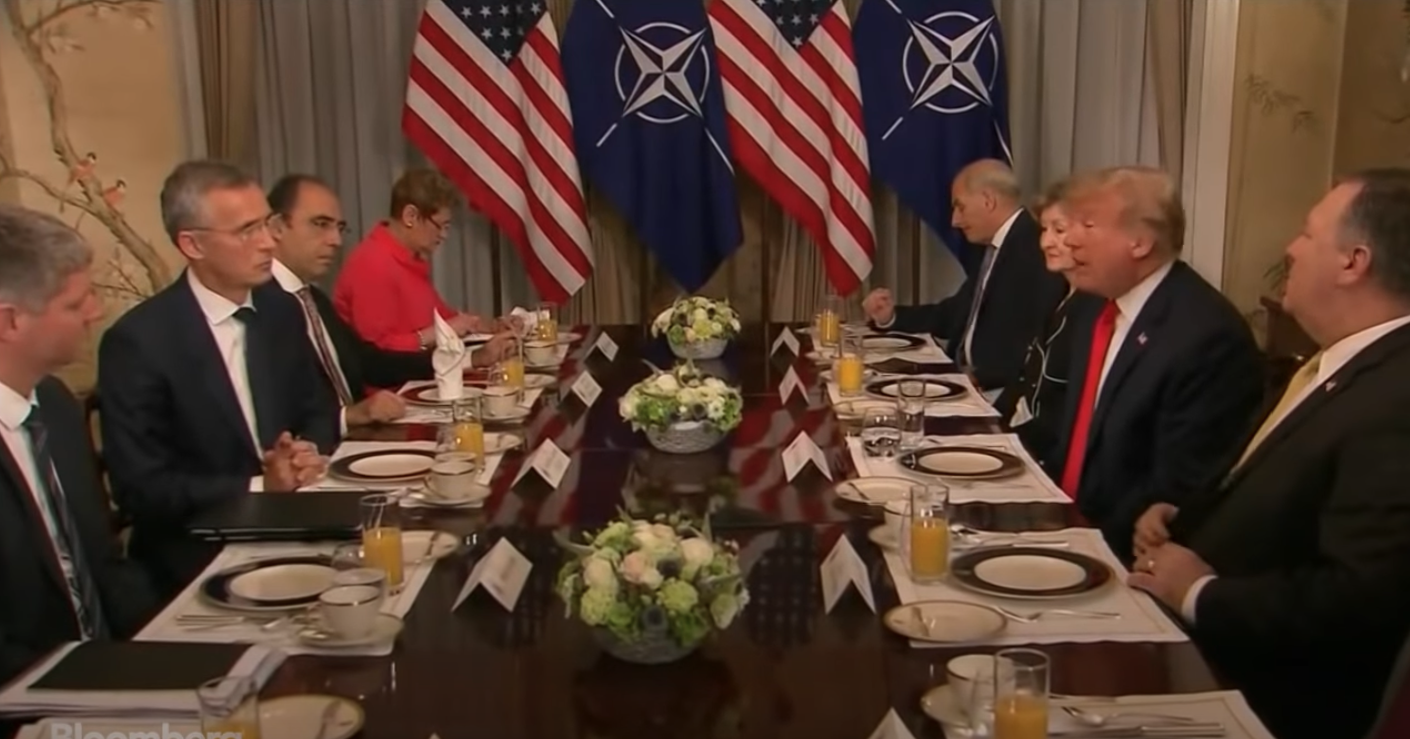
“Countries from the Baltics to Poland to Slovakia have been urging Berlin to abandon the project for years. And Trump’s own moves to halt it are supported by both Republicans and Democrats, a rare glimpse of bipartisanship in the deeply riven American Congress." - POLITICO analysis
Despite pressure to cancel the project, former chancellor Angela Merkel stressed Nord Stream 2 was a “business project” - and said she was “opposed to extraterritorial sanctions” from Washington.
TENSIONS WITH MOSCOW
Alexey Navalny - a prominent critic of President Putin - was poisoned with a nerve agent in August 2020. Putin himself was widely considered the architect, and pressure began mounting on Berlin to reconsider Nord Stream 2.
In January 2021, the European Parliament passed a resolution calling for a stop to NS2 completion. Despite these efforts, work on the project continued.
“Following years of deteriorating relations, MEPs stress the importance of critically reviewing cooperation with Russia in various foreign policy platforms and on projects such as Nord Stream 2. They call on the EU to immediately stop the completion of the controversial pipeline. MEPs also underline that the EU should no longer be a welcoming place for Russian wealth of unclear origin.” - European Parliament
The US, now under the leadership of President Biden, waived sanctions on the pipeline in May 2021 - with Secretary of State Antony Blinken describing its completion as "fait accompli".
Indeed, by July 2021 the pipeline operator announced construction was 99% complete.
FURTHER DELAYS
Despite construction being almost finished, in November 2021, the project faced regulatory delay - with the German regulator suspending certification after ruling its operator did not comply with German law.
Legal work began to rectify the issue, and it was the view of one expert that despite the setback, Nord Stream would be operational by mid-2022. However, recent events in Ukraine may have shifted the conversation entirely.
THE INVASION OF UKRAINE
As you will know, last Thursday Russia began its widely condemned invasion of Ukraine. Just days before, President Putin officially recognised the self-proclaimed republics in Luhanks and Donetsk in eastern Ukraine.
In the weeks prior German Chancellor Olaf Scholz - who was elected in December 2021 - came under increasing pressure from Western allies to warn of the impact to Nord Stream 2 should Russia invade its neighbour.
While Scholz initially stayed vague about what might happen, upon Putin's recognition of the regions as independent, he halted approval of Nord Stream 2. Scholz described President Putin’s actions as a “grave breach” of international law.
“Russia’s aggression against Ukraine has brought European dependence on Russian energy into sharp relief and set off a scramble for alternatives” - Council on Foreign Relations.
EUROPE'S RESPONSE
Even before the invasion had begun, European Commission President Ursula von der Leyen stressed the long-term need to ensure diversify and not be so reliant on Russian gas.
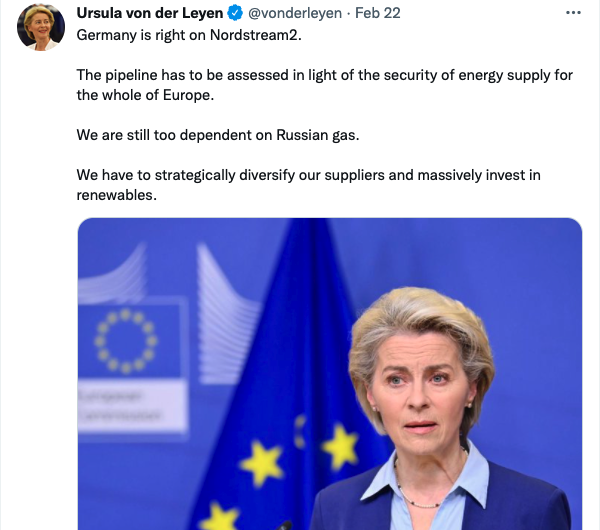
But in the short term, how has Europe reacted?
Russian gas supplies through Ukraine jumped by almost 38% on the day of the invasion, with European energy companies buying more natural gas. In part, this was due to market forces pushing up the price of non-Russian gas.
The EU has stressed it is buying more gas from alternative partners: “for this winter we will have enough supplies of LNG [liquified natural gas] from elsewhere, from reliable suppliers,” von der Leyen insisted. “We have been working hard [on that] in the last weeks.”
While Western leaders in recent weeks repeatedly expressed a preference to avoid sanctions that would disrupt energy supplies, The Financial Times noted in light of the "brutality" of the invasion it is "no longer off the table".
The article went on to point out that Canada - even though it is a "tiny buyer of Russian energy" - has blocked crude imports from Russia.
During the week, Biden's press secretary Jen Psaki spoke about America's current stance, while acknowledging they do want to reduce dependence on Russian energy.
"We don't have a strategic interest in reducing the global supply of energy, and that would raise prices at the gas pump for the American people, around the world, because it would reduce the supply available." - Jen Psaki
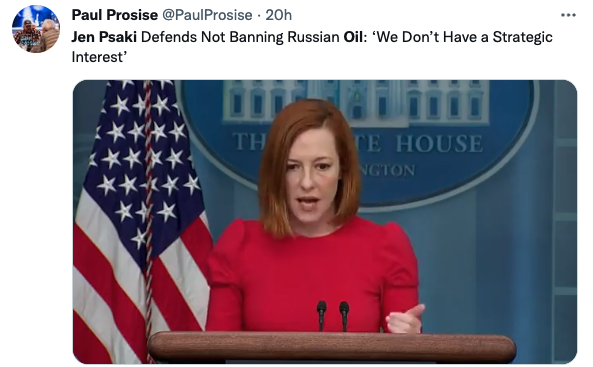
COULD PUTIN TURN OFF ENERGY SUPPLIES?
Over the years, critics of Nord Stream 2 have raised concerns it gave Russia too much sway over Europe. Indeed, it does remain a possibility that Putin could ‘turn off’ gas and oil supply to Europe - or use this threat for leverage.
If this were to happen, disruption in the continent would be inevitable. But most analysts believe countries would cope - due to stored gas supplies, the fact that warmer weather is on the way, and alternative sources of energy.
Indeed, some EU countries are reportedly planning to burn coal as an alternative to Russian gas.
The EU says it has received assurances from Norway, Japan, Qatar and the US for an increase in LNG [liquified natural gas] shipments if Putin were to turn off supplies to Europe. Consumers would, however, likely face higher energy bills as a result.
It would also be economically damaging to Russia - according to Jaime Concha of Energy Intelligence, Gazprom would face between $203m and $228m a day in lost revenues.
As such, most analysts view the immediate cessation of Russian gas as unlikely - due to the interdependency of this trading relationship.
It is, however, of note that others - such as Russian energy expert Thane Gustafson - are less sure;
“I don’t think it is unlikely at all that Putin would actually reach for the gas tap over Ukraine." - Thane Gustafson
RUSSIAN RAMIFICATIONS
The energy fallout from Russia’s invasion extends to business.
For example, British Company BP announced it would exit its 19.75% stake in the Russian state oil giant. In a statement, it described the invasion as "an act of aggression which is having tragic consequences across the region." As a result, its operating profit in 2025 would be around $2 billion lower than forecast.
Other companies are also planning to cut links with Moscow - with British Gas owner Centrica stating it is working to "exit our gas supply agreements with Russian counterparts, principally Gazprom, as a matter of urgency".
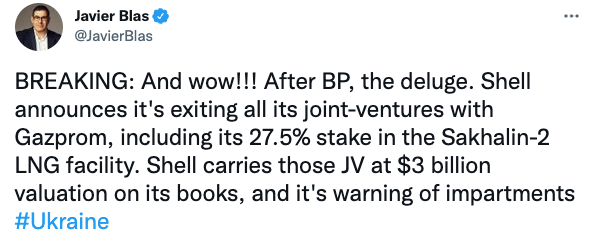
On Wednesday, reports emerged suggesting Nord Stream 2 had filed for bankruptcy and fired employees, due to US sanctions. However, its website says it "cannot confirm" the media reports about bankruptcy.
MOVING FORWARD
There are signs that the energy relationship between Russia and European countries will change - as the EU pivots away from Moscow.
While the EU has expressed a desire - particularly in recent weeks - to be less reliant on Russian energy, precise details of how this will be achieved are yet to be divulged.
For now, the continent continues to import vast amounts of Russian gas and oil - and Russia continues to supply it. But as with most aspects of a conflict, the situation remains fluid - and we will do our best to keep you updated.
THIS PIECE WAS BROUGHT TO YOU BY...

Babydoll Vintage is a sustainably driven online Womenswear boutique. Every purchase funds the planting of one tree.
When shopping consciously with us your style doesn't have to suffer. All pieces are carefully handpicked and are one of a kind so you can feel confident knowing you won't rock up in the same outfit as anyone else.
Rare and unique pieces, Always offering you that something special.
Babydoll15 for 15% off your order
